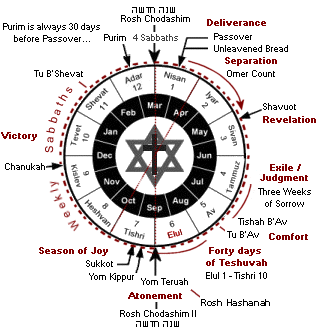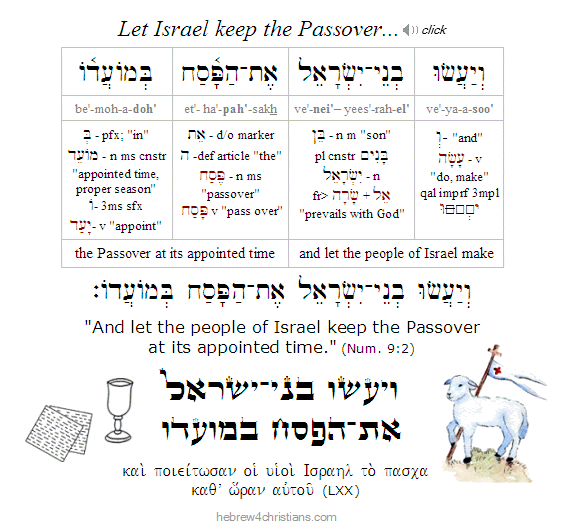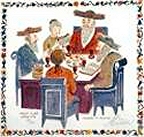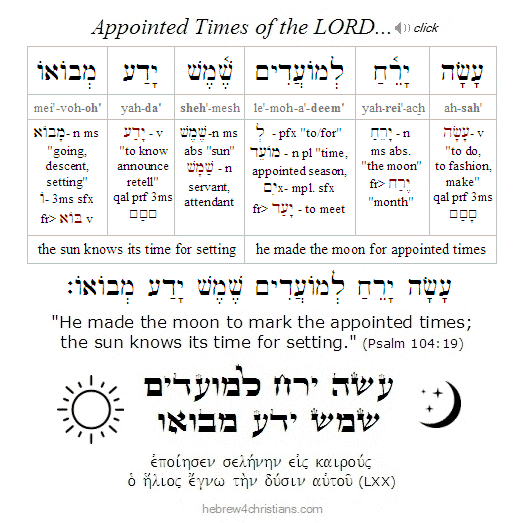|
The LORD is a God of order, and the appointed times (ū×ūĢų╣ūóų▓ūōų┤ūÖūØ), or holidays, were designed and intended to reveal prophetic truth about him.
The first of all of the Biblical holidays (ūŚūÆūÖ ū¬ūĢū©ūö) is the appointed time of Passover (ūŚūÆ ūöūżūĪūŚ). On the first day of Nisan, two weeks before the Exodus, God showed Moses the new moon and commenced the divine calendar (Exod. 12:1-2). Two weeks later, the Israelites kept the Passover by daubing the blood of the lamb on their door posts (Exod. 12:6-7). At the stroke of midnight of Nisan 15 God sent the last of the ten plagues on the Egyptians, killing all their firstborn (Exod. 12:12). Israel then left Egypt and crossed the sea seven days later to begin their trek through the desert.
On the 6th of Sivan, exactly seven weeks after the Exodus, Moses ascended Sinai to receive the Torah (Shavuot). Forty days later, on the 17th of Tammuz, the tablets were broken. Moses then interceded for Israel for another forty days until he was called back up to Sinai on Elul 1 to receive the revelation of the Name (YHVH). After this, he was given the second tablets and returned to the camp on Tishri 10, a date that later was commemorated as Yom Kippur, or the "Day of Atonement." Later the holiday of Sukkot ("Tabernacles") was instituted to recall God's care for the people as they trekked through the desert en route to the promised land.
 |
Beside the foretold visitation of the Messiah Yeshua to redeem Israel (Luke 2:25-32), the Exodus from Egypt (ūĪūÖūżūĢū© ūÖū”ūÖūÉū¬ ū×ū”ū©ūÖūØ) is the most fundamental event of Jewish history. In addition to being commemorated every year during the appointed time of Passover (Exod. 12:24-27; Num. 9:2-3; Deut. 16:1), it is explicitly mentioned in the very first of the Ten Commandments (Exod. 20:2), and it is recalled during Kiddush every Sabbath day (Deut. 5:12-15). The festivals of Shavuot ("Pentecost") and Sukkot ("Tabernacles") derive from it (the former recalling the giving of the Torah at Sinai and the latter recalling God's care as the Exodus generation journeyed from Egypt to the Promised Land). Indeed, nearly every commandment of the Torah (including the laws of the Mishkan (i.e., "Tabernacle") and the sacrificial system) may be traced back to the story of the Exodus. Most importantly, the Exodus prefigures and exemplifies the work of redemption given through the sacrificial life of Yeshua the Messiah, the true King of the Jews and the great Lamb of God (ū®ūéūö ūöūÉū£ūöūÖūØ).
In this connection note that the very first occurrence of the word "Torah" (ū¬ūĢū©ūö) in the Scriptures refers to the obedient faith of Abraham (Gen. 26:5), and the second occurrence refers to the law of Passover: "There shall be one law (ū¬ūĢū©ūö ūÉūŚū¬) for the native and for the stranger who sojourns among you" (Exod. 12:49). There is a link between these two occurrences. Abraham lived before the time of the Exodus, of course, and therefore he obeyed the law of Passover by means of the Akedah (the sacrifice of his "only begotten" son Isaac). Despite offering his son up upon the altar at Moriah, Abraham believed in the LORD and it was credited to him as tzedakah (righteousness). Abraham's obedience revealed that the inner meaning of Torah is that the "righteous shall live by faith" (Hab. 2:4, Rom. 1:17). The Torah of Passover (ū¬ūĢū©ū¬ ūöūżūĪūŚ) likewise teaches that redemption from death is possible through the exchange of an innocent sacrificial victim. The blood of the Passover was "a sign" of imputed righteousness that was obtained entirely by faith. This is the "korban" principle of "life-for-life" that underlies the Torah of the sacrificial system of the Tabernacle as well.
Observing Passover is crucial for God's people. In the Torah we read: "And the LORD spoke to Moses in the desert of Sinai, in the first month (ūæų╝ųĘūŚų╣ūōųČū®ūü ūöųĖū©ų┤ūÉū®ūüūĢų╣ū¤) of the second year after they had come out of the land of Egypt, saying, 'Let the people of Israel keep the Passover at its appointed time. On the fourteenth day of this month, at twilight, you shall keep it at its appointed time; according to all its statutes and all its rules you shall keep it' (Num. 9:1-3).
 |
Ultimately all true Torah points to Yeshua, who is the divinely appointed Redeemer and the beginning and goal of all of creation... "When the fullness of time (ŽäßĮĖ ŽĆ╬╗ßĮĄŽüŽē╬╝╬▒ Žä╬┐ß┐” ŽćŽüßĮ╣╬Į╬┐Žģ) had come, God sent forth his Son, born of woman, born under the Torah, to redeem those who were under the Torah, so that we might receive adoption as sons" (Gal. 4:4-5). As the psalmist later declared: "He made the moon for the appointed times" (Psalm 104:19). And since Yeshua came to perfectly fulfill the meaning of these appointed times, it is clear that he observed this calendar as well (Gal. 4:4-5).
Therefore let honor the Passover according to the appointed time of the LORD, namely, on the 14th day of the month of Nisan, the first month of the Biblical calendar, at twilight, as a time to be guarded for all generations (Exod. 12:42). As the Apostle Paul wrote: "Cleanse out the old leaven that you may be a new lump, as you really are unleavened. For Messiah our Passover Lamb has been sacrificed. Let us therefore celebrate the festival, not with the old leaven, the leaven of malice and evil, but with the unleavened bread of sincerity and truth" (1 Cor. 5:7-8). Amen! Worthy is the Lamb who was slain!
Hebrew Lesson:
Psalm 104:19 reading (click):
<< Return
|




